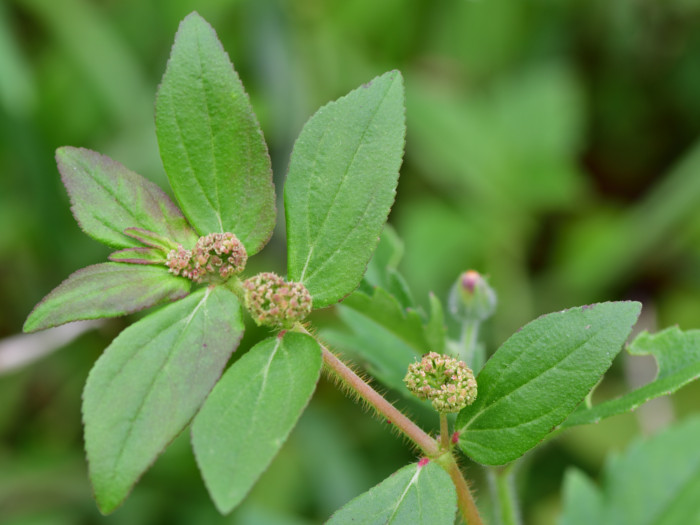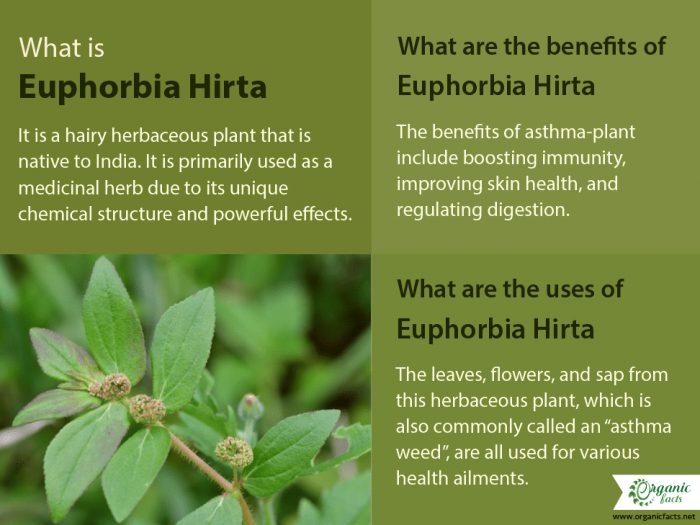If you haven’t come across Euphorbia hirta yet, it is time to read up or miss out. And what you will be missing out on are some potentially impressive health benefits that the modest-looking plant has to offer. While many remember to cite its possible properties like its ability to promote wound healing and alleviate a number of gastrointestinal disorders, it is also worth knowing that this is commonly known as the asthma plant. As the name aptly suggests, the plant is traditionally used as a part of asthma treatment in the regions where it grows.
What is Euphorbia hirta?
Euphorbia hirta is a hairy herbaceous plant that is often found growing on the roadsides in tropical parts of the world. Considered to be native to India, this weed has now become a pantropical species, which makes it very easy for its popularity to spread. It is primarily used as a medicinal herb due to its unique chemical structure and powerful effects on the body. It has been used traditionally for thousands of years, and research is ongoing to fully understand the potential of this humble plant and all the ways it can be used to benefit human health. [1]
All parts of the plant are effective in their own way and are used for specific ailments. The leaves, flowers, and sap from this herbaceous plant are all used in different ways and in different forms, depending on the ailment at hand. Let’s take a slightly closer look at the many health benefits of Euphorbia hirta. [2]

Euphorbia hirta (sometimes called asthma-plant) is a pantropical weed, possibly native to India. Photo Credit: Shutterstock
Health Benefits of Euphorbia Hirta
For a plant that can easily be categorized as weed or dismissed as an overgrowth in the wild, Euphorbia hirta surely offers a lot of health benefits that can be availed if you know how to use the plant. Let’s take a look at what the health benefits of Euphorbia hirta include:
May Relieve Asthma
One of the oldest, most known, and most popular uses of this weed, especially in traditional medicinal practices such as Ayurveda, is as an antiasthmatic. While there is not enough research to cite this as a solution to asthma, it works as an effective symptom management system. Euphorbia hirta [3]has a relaxing effect on the bronchial system, thus facilitating a relaxed respiratory system.
Possibly Remedial For Gastrointestinal Issues
Apart from what earns it the name asthma weed, arguably the second most popular health benefit offered by Euphorbia hirta is possible relief from gastrointestinal issues. It is said to work well against diarrhea, constipation, intestinal parasites, nausea, vomiting, heartburn, and peptic ulcers. A 2010 study published in Pharmacognosy Reviews found that quercitrin, a flavonoid glycoside in asthma weed works as a possibly antidiarrheal in mice. [4] [5] [6]

Euphorbia hirta is a hairy herbaceous plant that is often found growing on the roadsides in tropical parts of the world.
Possibly Wound Healing
The salves made from Euphorbia hirta can be applied directly to the skin on boils, wounds, rashes, burns, and other marks. This solution can speed the healing process by stimulating blood flow to the skin, stimulate the regrowth of new cells, and even contribute its antioxidant capacity to promoting healthier-looking skin. It can eliminate signs of aging and reduce the appearance of wrinkles and sun damage. [7]
Possible Antimalarial Properties
The plant, as well as the root, may have antimalarial properties, which may make the plants especially useful in tropical weathers where it is most prevalent. The qualities in the plant are also imparted by quercetin, according to a study titled, ‘Antimalarial Flavonol Glycosides from Euphorbia hirta’. [8]
A Word of Warning
It is not a good idea to consume large amounts of the herb orally, as it can induce vomiting, in some cases. Also, pregnant women should avoid the use of this herb. Other side effects are mild and infrequent. Speak with a trained herbalist or your medical practitioner to ensure that you are a good candidate for adding a powerful herbal remedy to your diet or health plan.
